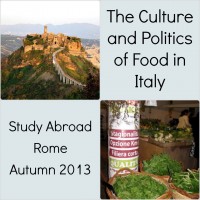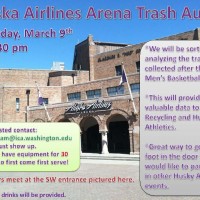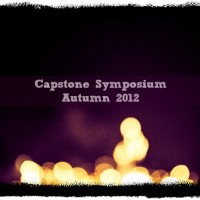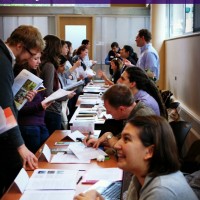Thank you to everyone who participated in the Program on the Environment’s Autumn 2012 Capstone symposium. From the presenters who put together excellent talks and posters, and the judges and staff who worked tirelessly behind the scenes, to the engaged audience asking thoughtful questions, this Autumn’s symposium was a tremendous success. Of course, the event would not have been possible without the many Site supervisors and Faculty advisors who provided guidance to our students throughout their Capstone. It is the commitment of our partners at UW and the larger environmental community that make the PoE Capstone experience what it is.
In case you missed our awards ceremony last night, the results are below. This symposium featured 12 oral presentations and 16 poster presentations. All oral and poster presentations were judged on content, style, and delivery by a panel of anonymous judges. Additionally, our audience voted for their favorites as part of the People’s Choice Awards. Congratulations to all of our winners; they will be listed on the PoE Capstone website for perpetuity (or at least a very long time), alongside winners of past symposia on our past projects page:
http://depts.washington.edu/poeweb/students/capstone/past_projects.html
Best Oral Presentation
Like Trying to Get Fat on Celery: A Reevaluation of the Plausibility of Currently Assumed Leatherback Sea Turtle Dietary Habits
Giulia Anderson
Site Supervisor: Todd Jones | Faculty Advisor: Tim Essington
Best Oral Presentation – Honorable Mention
Planning for Recovery: The Biology, Conservation, and Restoration of the Western Pond Turtle (Actinemys marmorata)
Samantha Zwicker
Site Supervisor: Jennifer Pramuk | Faculty Advisor: Aaron Wirsing
Best Poster Presentation
Strategies to Influence Environmental Stewardship in Federal Offices and For-profit Businesses
Terra Miller-Cassman
Site Supervisor: Melissa Winters | Faculty Advisor: Timothy Hargrave
Best Poster Presentation – Honorable Mention (TIE)
Forest Dynamic Models: The Influence of Understory Shrubs
Katie Hogan
Site Supervisor: James Lutz | Faculty Advisor: James Lutz
Evaluating the Effectiveness of Bovine Bacteroides as a Fecal Indicator in Puget Sound
Sylvia Howard
Site Supervisor: Linda Rhodes | Faculty Advisor: Linda Rhodes
People’s Choice – Oral Presentation
Planning for Recovery: The Biology, Conservation, and Restoration of the Western Pond Turtle (Actinemys marmorata)
Samantha Zwicker
Site Supervisor: Jennifer Pramuk | Faculty Advisor: Aaron Wirsing
People’s Choice – Poster Presentation
Green Stormwater Infrastructure Feasibility Analysis
Matt Coy & Mitch Halliday
Site Supervisor: Jo Sullivan, John Phillips | Faculty Advisor: Derek Booth, Chuck Treser
















